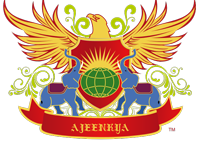
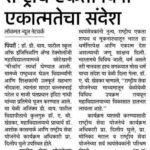
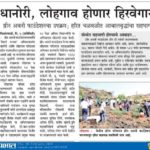
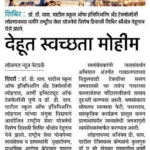
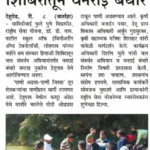
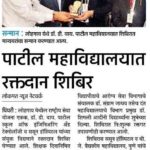
National Service Scheme
- History
National Service Scheme (NSS) was launched during 1969, the birth centenary year of Mahatma Gandhi, in 37 universities involving 40000 students. NSS is an extension dimension to the higher education system to orient the student youth to community service while they are studying in educational institutions. It is being implemented by the Ministry of Youth Affairs and Sports, Government of India.
- Aims and objectives of NSS
- To understand the community in which they work;
- To understand themselves in relation to their community;
- To identify the needs and problems of the community and involve them in problem solving process.
- To develop among themselves a sense of social and civic responsibility;
- To utilise their knowledge in finding practical solution to individual and community problems;
- To develop competence required for group-living and sharing of responsibilities:
- To gain skills in mobilising community participation;
- To acquire leadership qualities and democratic attitude;
- To develop capacity to meet emergencies and natural disasters; and
- To practice national integration and social harmony
- Motto of NSS
The motto or watchword of the National Service Scheme is “NOT ME BUT YOU”.
- NSS Symbol
The NSS symbol is based on the “Rath” wheel of the Konark Sun Temple situated in Odisha.
The navy blue colour indicates the cosmos of which the NSS is a tiny part, ready to contribute its share for the welfare of the mankind.
The Red colour in the badge indicates that the NSS volunteers are full of blood i.e. lively, active, energetic and full of high spirit.
The giant wheels of the Sun Temple portray the cycle of creation, preservation and release, and signify the movement in life across time and space.
- Enrollment in NSS
NSS is a voluntary scheme. NSS scheme starts from 11th Standard onwards. At college level the NSS volunteers will be enrolled from the first and second year degree-class students. The students from foreign countries studying in Indian universities can also join NSS so that they may share the experiences of national reconstruction and community work. NCC cadets will not be allowed to join NSS. Similarly NSS volunteers will not participate in NCC or any other youth organization as long as they are in NSS.
An NSS volunteer needs to devote a total of 240 hours social service in two years duration. Every year, a NSS volunteer has to devote 20 hrs. of orientation and 100 hrs. of community service.
To enroll as NSS volunteer, contact the NSS Programme Officer of your school / college. Enrollment in NSS is free.
The NSS volunteers on successful completion of the required hours of service are issued a certificate. NSS volunteers can get some weightage during admissions in higher studies and other benefits as decided by the institutions/university.
- Administrative structure in NSS
At School / college level
The unit at college/+2 level is the grass-root unit in NSS. An institution will be allotted NSS units according to the strength of students. The number of units will be allotted by the Programme Coordinator in consultation with NSS Regional Directorate and State NSS Officer considering the demands of the institution. The strength of a unit will be 100 NSS volunteers normally. A Programme Officer will be incharge of a NSS unit. Ony those belonging to the teaching faculty will be considered for appointment as Programme Officer. Programme Officer will be responsible for the organisation of NSS unit, implementation of NSS programme under the supervision and direction of Principal of the college or head of the institution.
At University level
Every University has an NSS Cell to supervise and coordinate NSS Programme in Colleges affiliated to it. The Universities having strength of more than 10000 NSS volunteers have full time Programme Coordinators. The Universities having strength of less than 10000 NSS volunteers h ave part time programme coordinators.
At state level
At the State level, a State NSS Cell headed by the State Liaison Officer (SLO) coordinates the programme. The Government of India extends cent percent financial assistance for establishing the State NSS Cell.
At Regional level
NSS Regional Centes have been established in the country to maintain liaison with the State Governments, Universities, +2 Councils and TOC/TORCs for the effective implementation of NSS Programme. NSS Regional Centre (RC) which is a subordinate field office of the Ministry of Youth Affairs & Sports is established depending upon the volunteer’s strength and size of the state. It is either headed by a Deputy Programme Adviser or an Assistant Programme Adviser. The Deputy Programme Adviser/Assistant Programme Adviser belongs to Group-A grade of the Central Government Service.
- Present status
Today NSS has more than 3.2 million student volunteers from 298 universities, 42 (+2) senior secondary councils and Directorate of Vocational Education.
- Activities undertaken by NSS
- Orientation of NSS Volunteers:To get the NSS volunteers acquainted with the basics of NSS programmes, 20 hours are allocated for their orientation through lectures, discussions, field visits, and audio-visuals etc.
ii) Campus work :
The NSS volunteers may be involved in the projects undertaken for the benefit of the institution and students concerned. Such projects cover development of play grounds, laying of gardens, tree plantation in the premises, awareness programmes on drug-abuse, AIDS, population education and other projects. The NSS volunteers may work on campus projects for not exceeding 30 hours in a year:
(iii) The remaining 70 hours will be utilised for community service on the projects in adopted villages/urban slums independently or in collaboration with others in this field, as detailed below.
(a) Institutional work: The students may be placed with selected voluntary organisations working .for the welfare of women, children, aged and disabled outside the campus.
(b) Rural Project : The rural projects generally include the working of NSS volunteers in adopted villages for eradication of illiteracy, watershed management and wasteland development , agricultural operations , health , nutrition , hygiene , sanitation, mother and child care, family life education, gender justice, development of rural cooperatives , savings drives , construction of rural roads , campaign against social evils etc.
(c ) Natural calamities .& National Emergencies : The NSS units are expected to utilise the services of NSS volunteers at the time of natural calamities and national emergencies for mobilising public support and rendering necessary assistance to the authorities in rescue, relief and rehabilitation. In such emergencies and calamities the Programme Officers are expected to take the initiative and offer the services of the NSS units and its volunteers to assist the administration.
(d) National Days and Celebrations: The National Service Scheme programmes also include the celebration of National days. The purpose of such a provision is to celebrate such occasions in a befitting manner.
National Programmes :
In the development of any nation , certain programmes assumes special relevance in view of problems existing or anticipated. In our country, three such programmes have been launched . They are the Mass Programme of Functional Literacy, AIDS Awareness Programme and Sustainable development with emphasis on Watershed Management & Wasteland Development. It is pertinent to mention here that NSS Volunteers have come forward with zeal to make these
programmes a great success.
